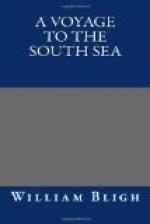Sunday 13.
Birds as usual were about the ship and some of them caught; and for the first time since we left Staten Land we saw some whales. This morning, owing to the violent motion of the ship, the cook fell and broke one of his ribs, and another man, by a fall, dislocated his shoulder. The gunner who had the charge of a watch was laid up with the rheumatism: and this was the first sicklist that appeared on board the ship. The time of full moon which was approaching made me entertain hopes that after that period we should experience some change of wind or weather in our favour; but the event did not at all answer our expectations. The latitude at noon this day was 58 degrees 9 minutes south and longitude 76 degrees 1 minute west.
As we caught a good many birds but which were all lean and tasted fishy we tried an experiment upon them which succeeded admirably. By keeping them cooped up and cramming them with ground corn they improved wonderfully in a short time; so that the pintada birds became as fine as ducks, and the albatrosses were as fat, and not inferior in taste to, fine geese. Some of the latter birds were caught that measured seven feet between the extremities of the wings when spread. This unexpected supply came very opportunely; for none of our livestock remained except hogs, the sheep and poultry not being hardy enough to stand the severity of the weather.
Sunday 20.
This morning the wind died away and we had a calm for a few hours which gave us hopes that the next would be a more favourable wind. A hog was killed for the ship’s company which gave them an excellent meal. Towards noon, to our great disappointment, the wind sprang up again from the westward and in the afternoon blew strong with snow and hailstorms.
Monday 21.
This was the second day after the full moon but, as I have remarked before, it had no influence on the weather. At noon our latitude was 58 degrees 31 minutes south and longitude 70 degrees 7 minutes west, which is near seven degrees to the eastward of our situation on the morning of the 9th instant, when we had advanced the farthest in our power to the westward, being then in 76 degrees 58 minutes west, three degrees to the west of Cape Deseada, the west part of the Straits of Magellan; and at this time we were 3 degrees 52 minutes to the east of it and hourly losing ground.
It was with much concern I saw how hopeless and even unjustifiable it was to persist any longer in attempting a passage this way to the Society Islands. We had been thirty days in this tempestuous ocean. At one time we had advanced so far to the westward as to have a fair prospect of making our passage round; but from that period hard gales of westerly wind had continued without intermission, a few hours excepted, which, to borrow an expression in Lord Anson’s voyage, were “like the elements drawing breath to return upon us with redoubled violence.”




